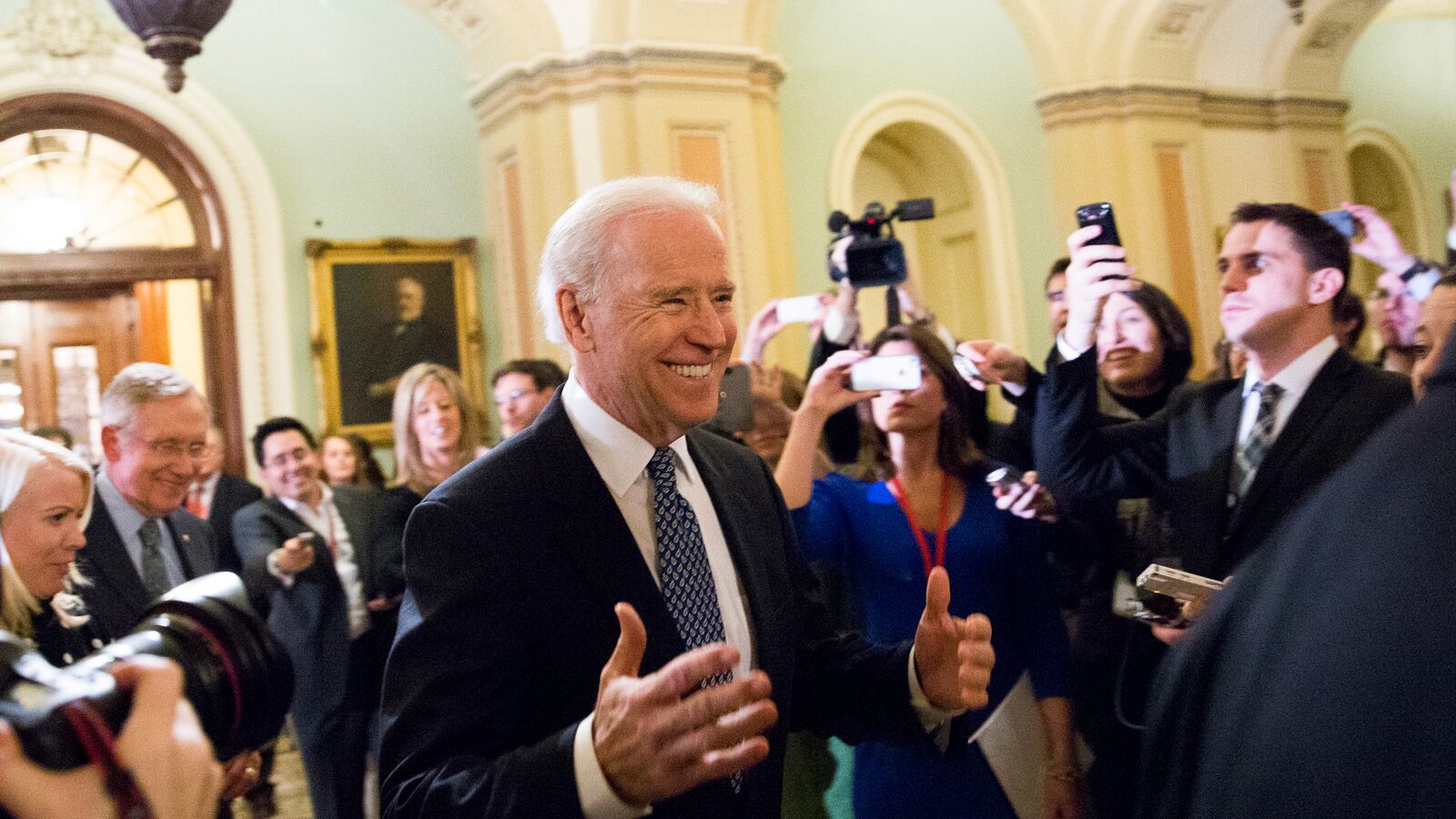After stepping (or stumbling) back from the fiscal cliff, we have a zombie Speaker of the House, his authority as dubious as his tan, his hold on the gavel barely reconfirmed—a hold reliant on a promise that he will no longer sit down one-to-one with the president of the United States to seek bipartisan agreement.

John Boehner is less the Speaker than a battered ventriloquist for the Tea Party klatch in his caucus. Don’t hold your breath waiting for him to accept Democratic Leader Nancy Pelosi’s offer as she introduced him on the House rostrum—to come together and find “the common ground that is a higher, better place for our country.”
Instead, the sequel to the end-of-the-year chaos on Capitol Hill is nearly certain to be a Congress that creates crises rather than solves problems. Indeed, the fiscal-cliff confrontation is a precursor of irrepressible conflicts ahead—conflicts that have potentially decisive consequences for the Obama presidency and the economy. There are also political consequences—for 2016 and beyond, and even for the viability of a system of checks and balances that increasingly resembles a charter for permanent checkmate, where the grand bargain on virtually anything seems impossible and even the petty deals are excruciatingly difficult.
The president has been criticized either for doing too little or conceding too much. He has been “missing in action” because he has failed to offer a comprehensive plan for “fiscal reforms.” Never mind that he has sent Congress budget proposals for far-reaching deficit reduction that were routinely disdained by a Mitt Romney-in-waiting GOP. The proposals don’t meet the Beltway standard of inflicting the most pain on the middle class and the poor, and thus would lead Republicans to pursue them with draconian zeal, although their leadership dares not speak the specifics. Instead, they hid behind the vague googooism of “entitlement reform,” in which they would shred everything from Social Security and Medicare to food stamps, college loans, and of course the “socialist” transgression that has so seized and obsessed them—health-care reform.
The GOP lost not only the last campaign, but the last century. Unable to steal the majority—Barack Obama is the first president since Dwight Eisenhower to win more than 51 percent in two successive elections—the losers are still determined to repeal the New Deal, the New Frontier, and the Great Society.
On the other side, there are some progressives who insist that Obama shouldn’t give an inch. He was ready to tweak the cost-of-living formula for Social Security. Progressives denounced the measure as a betrayal of fundamental principle, when in fact it would have just a minor affect on benefits—and most of that 20 years from now. Similarly, they complain that the threshold for the top tax rate was set at $400,000 a year, not the $250,000 the president campaigned on. This is a reflex mirror image of right-wing dogmatism. As Lawrence O’Donnell argued on MSNBC, the $250,000 demarcation line for the top bracket—set under Bill Clinton—today equals $397,000 if adjusted for inflation.
There are liberals who preferred going over the cliff to compromising. It may be easy to indulge this purist impulse if you’re not one of the millions of Americans who would have lost jobs in a post-cliff downturn, lost their unemployment benefits and been left with nowhere to turn, or lost the child- and earned-income-tax credits that are a lifeline for families and the economy. Obama saved all that—and saved the nation and the world from a recession—just as he averted a depression in 2009. Perhaps disappointed progressives can take comfort from the acid verdict of überconservative columnist Charles Krauthammer: for Republicans, the final deal was “a complete surrender on everything ... a rout.”
What was the alternative: for the president to stomp his feet? That might make hardline Democrats feel better, but it would inflict untold damage on people, unravel the recovery, and undermine whatever confidence remains in our capacity to govern.
Moreover, Obama is now in a position to stand his ground on raising the debt ceiling. His approval rating was at a three-year high as the battle was joined on the fiscal cliff , while Boehner’s fell to rock-bottom levels and more than 50 percent of Americans said the GOP was “too extreme.” Republicans are threatening to blackmail the White House into slashing spending by holding the debt limit hostage. Default on the full faith and credit of the United States would be an economic catastrophe—which is why the business community and Wall Street will attempt to rein in the House majority they put into office. And then there’s the Senate. Pennsylvania’s far-right Senator Pat Toomey may be willing to filibuster the nation into default and a government shutdown. He ought to ask Newt Gingrich how well that worked out the last time.
The resulting fallout for an already tarnished and demographically desiccated GOP would be political poison; in 2014, the Republicans could defy history and nullify their own gerrymandering by taking a big defeat in the midterm elections. And this year will provide a preview in Virginia, where the party’s nominee for governor, Ken Cuccinelli, is the retrograde face of revanchist ideology—extreme on social issues and entirely hostile to economic fairness. He is already nearly unelectable, according to the state’s Republican lieutenant governor, who was forced out of the race when the Tea-types and the religious right rigged the process. If Boehner and the crazies in Congress crater the government and the nation’s credit rating, it will be goodbye Ken.
New Jersey is a different case that proves the same point. Gov. Chris Christie, by now a figure of antipolitical folklore, is a lock for reelection precisely because he first put his hurricane-ravaged state ahead of Romney’s prospects—and then pungently buddy-slapped Boehner for killing disaster relief in the twilight of the last Congress. It was a withering moment, amplified by a revolt among the few remaining GOP House members in the Northeast. The Speaker lip-synced a promise to move the legislation with deliberate speed; like the fiscal-cliff bill, he may have to rely on Democratic votes since there are antediluvian forces in his ranks who say they oppose federal help in principle or without offsetting cuts—you guessed it, in things like antihunger programs or aid to education. And it matters that the recovery money would go to New Jersey and New York, which for many in a Southern, rural and resentful party are nothing more than a deep-blue Sodom and Gomorrah.
(Even if they are a source of rivers of campaign cash.)
Christie is that rare Republican who could compete for electoral votes in areas that have become terra incognita for GOP presidential hopefuls. But by doing his job, he may have committed unforgivable heresy in a Santorum-leaning party. As governor, he won’t even try to repeal civil unions—and he has recommended a referendum on marriage equality, which would almost certainly pass in New Jersey. That falls short of what justice demands, but imagine how it would go over in a GOP primary debate on Fox News. Christie could win in the fall, but could he win in the spring among true believers who would rather be far-right than elect a president?
Another potential 2016 candidate played a central, probably indispensable role in guiding us off the fiscal cliff. As the clock ticked down, Vice President Joe Biden negotiated his way through what appeared to be an impassable thicket of discord and disagreement. Hillary Clinton is a more than formidable obstacle to any other Democratic contender, but no one knows—probably she doesn’t know—what she will do. And Biden is, as the president said when the compromise finally passed, “extraordinary.” The lazy press caricatures of Biden are being steadily confounded—by his skill and appeal in the 2012 campaign, by his counsel on Afghanistan and terrorism, by his capacity to discuss, persuade, and shrewdly trade with the congressional GOP.
Obama understands Biden’s value—and has now dispatched him to handle the intractable question of guns. Don’t bet he won’t find a way through again. In terms of real achievement, he is the most effective vice president in American history. Dick Cheney was effective, of course—at bullying the intelligence community and lying us into the Iraq war. Health concerns aside, he could never have successfully run for president. Biden can—and may—and the past week points in that direction.
Biden’s partner in the negotiations was Senate Republican Leader Mitch McConnell, who, to his credit, briefly swore off tea drinking to do what was essential for America. But the full job is undone. And fearing a primary challenge in Kentucky, McConnell is back to preaching the GOP gospel of reaction on the debt limit. So prepare for a rough ride that will lead to prosperity or recession, that will recast politics and perhaps make a president.
The past week gives both hope and doubt that sometime soon, after the posturing ends and the shouting fades, we may finally seek and stand on an imperfect span of common ground. Nancy Pelosi was right: that is “a higher, better place for our country.”





